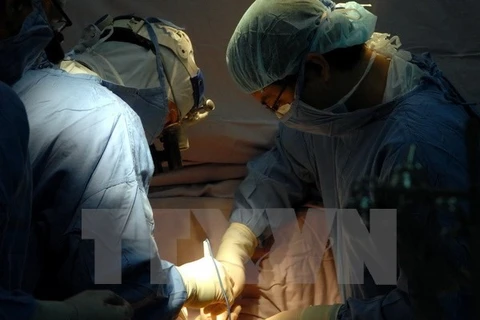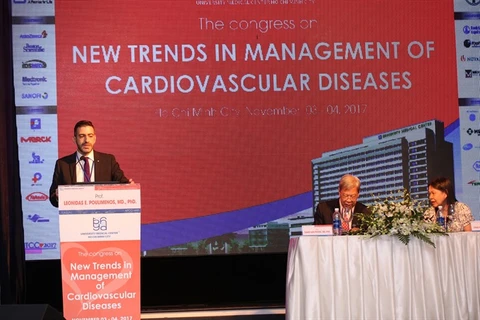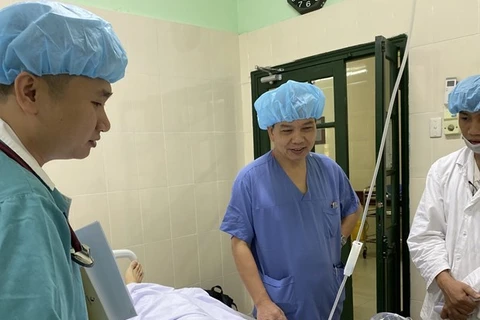 Doctor Nguyen Ly Thinh Truong, Director of the Children's Cardiology Centre at the Vietnam National Hospital of Pediatrics, examines the Lao newborn who suffers from transposition of the great arteries, a rare congenital defect. (Photo: VietnamPlus)
Doctor Nguyen Ly Thinh Truong, Director of the Children's Cardiology Centre at the Vietnam National Hospital of Pediatrics, examines the Lao newborn who suffers from transposition of the great arteries, a rare congenital defect. (Photo: VietnamPlus) Hanoi (VNA) – A newborn from Laos has been airlifted to Hanoi for the emergency treatment of heart problems.
Palamy Imthapattha, who is now almost one month old, was diagnosed with transposition of the great arteries, a rare congenital defect with the two main arteries leaving the heart being reversed, when she was just eight day old, according to Doctor Nguyen Ly Thinh Truong, Director of the Children's Cardiology Centre at the Vietnam National Hospital of Pediatrics.
The 3.1-kg baby was brought to the Noi Bai International Airport from Vientiane on November 1 after Lao doctors asked for help from their fellow doctors at the Vietnam National Hospital of Pediatrics.
Her condition worsened on arrival at the Hanoi-based airport but it was fortunate that the Vietnamese doctors were available to provide her with first aid. She was immediately taken to the hospital and underwent a three-hour arterial switch operation, also known as Jatene surgery.
The baby's coronary artery was less than 1 millimeter, making the case even more complicated, Truong said. But the life-saving surgery succeeded, marking the 500th arterial switch operation the centre has performed on children, he added.
After spending two hours on a ventilator and six days in a recovery room, the baby was in stable condition.
The ultrasonic check result on November 21, 20 days after the surgery, showed that the child’s heart was functioning normally and it was discharged from hospital the next day. The baby can now sleep and eat well.
The life-saving surgery was the 500th successful arterial switch operation conducted by the Vietnam National Hospital of Paediatrics. The smallest patient was a one-day-old baby.
 Family of the Lao newborn, Palamy Imthapattha, presents flowers to doctors of the Children's Cardiology Centre at the Vietnam National Hospital of Pediatrics on the day she is discharged from the hospital (Photo: VietnamPlus)
Family of the Lao newborn, Palamy Imthapattha, presents flowers to doctors of the Children's Cardiology Centre at the Vietnam National Hospital of Pediatrics on the day she is discharged from the hospital (Photo: VietnamPlus)
Transposition of the great arteries is a not very rare congenital cardiac defect as it accounts for 5 – 7 percent of the congenital heart disease cases, corresponding to 20 – 30 children in 100,000 live births and there is a high mortality rate if untreated.
It is said to cause deaths in 80 – 90 percent of children in their first year after birth if it is not detected. Some 30 percent would die within the first week after birth without proper treatment. Children with the rare defect are unable to undergo surgery when they are 2 – 3 months old.
Treatment of this congenital malformation is still a big problem not only for the Vietnamese medicine but also in developed countries.
In Vietnam, only some cardiology centres have the ability to provide interventional therapies and perform repair arterial switched operations. The patients are still diagnosed late and the mortality rate therefore is still very high due to delayed treatment.
The arterial switch operation has become the standard corrective surgery for patients with transposition of the great arteries. The method has a high success rate with early mortality below 5 percent.
According to Truong, the Children's Cardiology Centre has provided five-year training and experience sharing courses for Lao doctors in recent years. For complicated congenital cardiac defect cases, doctors in Laos will advise and refer patients to the National Hospital of Pediatrics for treatment.
Doctors recommend pregnant women to get periodic prenatal check-ups for early detection of a heart detect in the fetus./.























